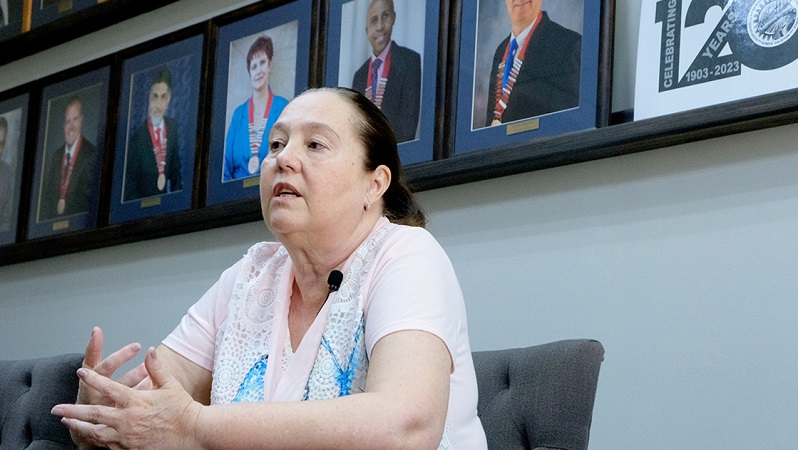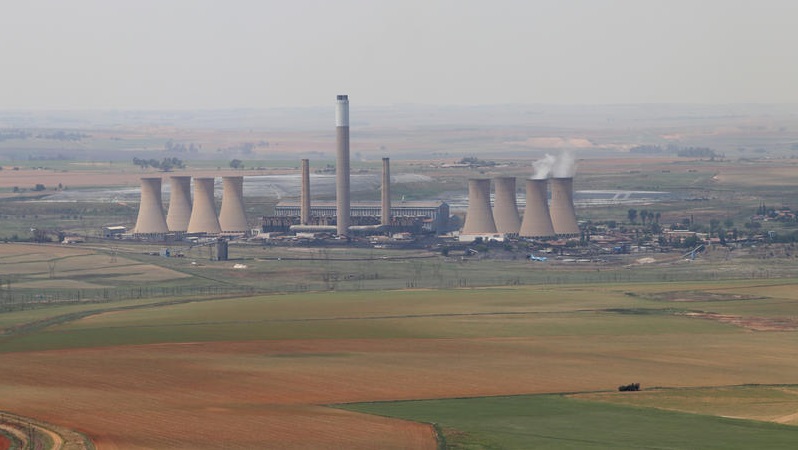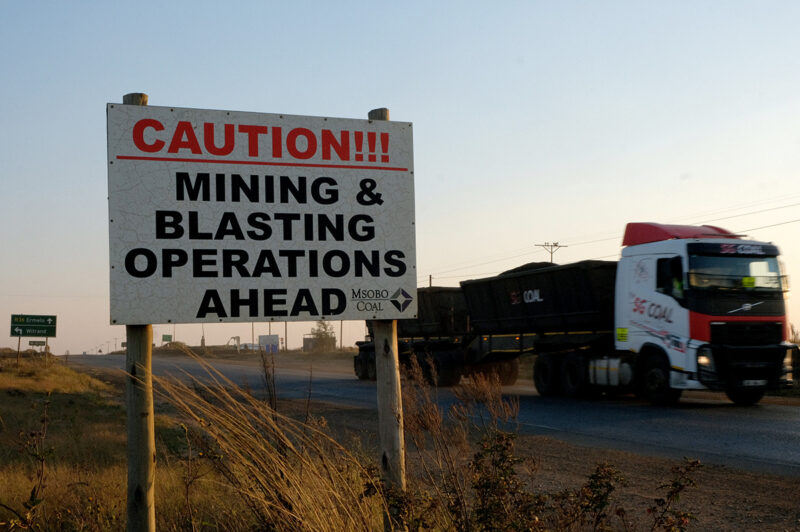A business coalition in South Africa’s energy heartland is fighting against plans to shut down coal plants.
Business interests in South Africa’s electricity capital want to keep coal-fired power plants running, despite government plans to phase out the fuel and concerns by some in the local communities.
The proposals of the local business association have gained support from local politicians and at least one executive in the state-run power company that currently operates the coal mines and come as South Africa’s electricity minister argues that coal plant closures should be delayed.
While local communities have expressed concerns about the economic impact of the closure of coal power plants, there has also been local criticism of the coal industry itself particularly its role in causing air pollution and damaging peoples’ health.
The closures are part of South Africa’s Just Energy Transition Partnership (JetP), an effort to reduce the electricity sector’s greenhouse gas emissions, which made up 45% of the country’s total emissions in 2017. Largely because of its reliance on coal, South Africa’s emissions are ten times higher than the sub-Saharan African average.
Just transition?
As well as helping cut the country’s carbon emissions, the JetP is meant to help communities adapt to the new energy and industrial landscape.
Ronesa Mtshweni has been a part of the coal value chain all her life. She was raised by a coal mine worker father and worked herself in a coal mine for seven years.
But she is now fighting against coal mining because of the pain she has seen it cause and the problems local communities are left to deal with.
Ronesa Mtshweni from Womandla Community Development. (Photo: Ashraf Hendricks)
Mtshweni lives in Carolina, Mpumalanga, about half an hour’s drive from Hendrina power station, one of the country’s biggest and oldest coal plants. It is one of nine coal-fired power stations scheduled to be shut by 2035, most of which are in Mpumalanga province.
But Mtshweni, founder of non-profit organisation Womandla Community Development, said that the planned closure of Hendrina had sparked concerns on the ground.
“People are in fear because they benefited from that power station, they benefited from the nearby mines and now that the power station is closing down, they just don’t know what’s going to happen to them, what’s going to happen to their livelihoods,” she said.
Coal communities fear South Africa’s clean energy transition
One proposal is that the plants are shut down and replaced with a combination of either solar or wind farms or colleges teaching clean energy skills.
Another is that the coal plants are privatised and kept open or converted – either fully or partially – to run on other energy sources.
That’s the proposal of the Middelburg Chamber of Commerce and Industry (MCCI), a coalition of businesses based in the Mpumalanga coal mining and farming belt.
Keeping the lights on
Anna-Marth Ott, chief executive of the MCCI, said it is important for the regional business community to ensure the economy it operates in remains strong and that their businesses run profitably.
“People look at this region and it’s as if they are gleeful that the towns are going to be ghost towns and we’re going to suffer and it’s going to be the worst economic impact for us,” Ott said. “I’ve got very bad news for you – if it happens here, it will impact everybody. A large portion of the income generated through Sandton [a wealthy part of South Africa’s biggest city Johannesburg] is generated here.”

Anna Marth Ott, CEO of the Mpumalanga Chamber of Commerce (Photo credit: Dianah Chiyangwa)
Ott said MCCI raised the private take-over concept in February 2020 with André de Ruyter, the former chief executive of Eskom, a state-owned company that produces and distributes most of South Africa’s electricity.
That meeting was to discuss how business could get involved in the repurposing of Komati, which in October 2022 was the first coal plant in the country to be closed down.

The Komati power station, pictured in 2018. (Photo credit: Ruth Sacco/Greenpeace)
Ott said that they wanted Komati because its not as big as Hendrina and it is close to a gas pipeline, making it easier to convert it from coal to gas. “We thought we could turn it into an energy generation university as well,” she added.
After these plans failed to materialise, the chamber turned its attention to the next in line in the country’s coal power plant closure plans, Hendrina, which is set to shut between the end of 2023 and 2025.
Coal no problem
Ott said that if the coal industry is “responsible” and addresses local environmental impacts then “there is no problem in using coal”.
She claimed that there cannot be a total shift away from coal to renewables due to a requirement for baseload power.
The idea is that coal provides a minimum constant level of electricity to manage the inherent variability of solar and wind farms, which produce less electricity when the sun and wind are weak.
But there are ways to lessen the effects of this variability through interconnecting electricity grids, storing electricity in batteries for when it is needed most and by managing electricity demand at peak times. There are also zero-carbon sources of more reliable baseload power like nuclear energy and hydropower.
On average, two-thirds of South Australia’s grid electricity is from solar and wind. In South Africa, its currently less than a tenth.
Cop28 moots oil and gas initiative despite greenwash accusations
Ott said that the manufacturing sector in particular “cannot operate on solar power” as it requires a “massive amount” of electricity and a minimum level of baseload power.
She does not completely oppose green energy though, as she said that South African manufacturers of certain products will need to reduce their carbon intensity to lessen the carbon border taxes they pay when exporting to the European Union.
Repurposing Hendrina would involve using the power station’s different units in various ways, she said. “We may try hydro [power] in one, hydrogen in another and a new coal-burning system in the other. The idea is to find the most optimal green solution for energy usage in the area.”
But hydropower relies on building a dam on a river, which Hendrina does not have nearby and according to the International Energy Agency (IEA), gas turbines can not currently run completely on hydrogen and are not expected to do so until at least 2030. Hydrogen can be produced using either renewables or fossil fuels so is not necessarily green.
Mining boost
Making Hendrina run on coal again might also extend the life of Mpumalanga’s coal mines.
Ott said Steve Tshwete municipality alone has about 120 coal mines. She said most of this is exported so coal mining will continue “unless things drastically change in the rest of the world”.
The IEA predicts that global coal use will stay at its current level until 2025 when it will begin to fall from 2025 as major coal users like China and India seek to meet their net zero targets.

The road to Carolina. (Photo: Dianah Chiyangwa)
Thomas Mnguni, a resident of Mpumalanga and campaigner at non-profit environmental justice organisation groundWork, is concerned about the MCCI’s plans to privatise energy production.
“We do not want to see our energy system in private hands,” he said. “For me it’s very critical to make sure that we get our government to begin to construct renewable energy plants that will be owned by the state and the public, not the private sector.”
Mnguni did not see MCCI’s plans to refurbish Hendrina, which would include the installation of scrubbers to remove sulphur emissions to comply with air quality regulations, as financially feasible. The government estimates that refurbishing three power stations including Hendrina would cost $2.6 billion.
He said: “What I fear is that we will see increased levels of pollution that will have a negative impact on people’s health and nobody will be held accountable. We’ve seen how our government has failed in terms of air quality governance, how the health department is absent when it comes to making sure that air pollution does not affect people’s health.”
He called for the government to build renewable plants “that will be owned by the state and the public not the private sector”.
Eskom backing
Outgoing Eskom chief operating officer Jan Obeholzer last month expressed support for turning Hendrina into a gas power station. Oberholzer reportedly said independent operators would be invited by Eskom to table their plans for the plant in a public process.
Details around how the Hendrina take-over would work are not yet clear and no agreements have been concluded, Ott said.
However, she accepted it would be not be a cheap job. “It’s more expensive sometimes to repurpose, but on the other hand, if the basic infrastructure is there, why not use it? Or do you want to have [nothing but] gravestones in our region?”
In recent weeks, Kgosientsho Ramokgopa, South Africa’s newly appointed electricity minister, has indicated that plans to shut coal plants are likely to be delayed to stave off ongoing planned power cuts, as the supply of electricity is not consistently enough to meet demand.
Ramokgopa has also expressed interest in public-private partnerships to fund solutions for the energy crisis.
Questions sent to Eskom about decommissioning plans at Hendrina power station remained unanswered at the time of publication.
Local government support
Local government officials said they supported the MCCI approach, particularly if it means reduced prices for electricity consumers.
“Eskom was built in the past from small independent power producers, so the Chamber of Commerce could be successful in taking over the power station and definitely we as a municipality will support that,” said Ntokozo Gubevu, director of electrical engineering services at Steve Tshwete municipality. “The decommissioning and repurposing of the power plant will bring benefits in terms of power purchases.”
Currently, the municipality buys electricity from Eskom and sells it on to consumers at the Eskom rate, which is constantly rising, Gubevu said. “At the municipality we are looking forward to having more [independent power producers] generating more electricity for the municipality because we believe our ratepayers will get relief from the current high electricity tariffs.”
But Gubevu said that, although closing down Hendrina power station will not have an immediate impact on the municipal electricity supply, it will directly affect the community of Hendrina and neighbouring communities that are currently receiving services such as water directly from Eskom.
“There is a [water] pipeline going from the plant all the way to our Hendrina residential area as well as KwaZamokuhle location, so those areas will be affected by decommissioning the station and we’ll have to look at alternative ways to get the water supply to those areas.”
Gaylor Montmasson-Claire, an economist at the Trade & Industrial Policy Strategies think tank, said this might be one of the most pressing challenges from the closure of Hendrina.
An easy solution would be to transfer the provision of water and sanitation services to the affected areas back to the municipality. “But that still raises some questions about whether the municipality will have the resources to maintain and operate those services,” he said.
On the ground
Back in Carolina, Mtshweni said talks on the JetP have not been transparent, and there is little to no real awareness about it or how people can adapt to the changes it will bring.
“As an individual, as a community member, what I understand is a just transition is that – the word ‘just’ means that we’re all going to benefit from it. Is it true we all are going to benefit from it? Especially looking at the fact that our area is surrounded by so many mines.”
“We have an issue of water pollution in our area, and of sound [pollution] as well. There are so many trucks moving in and out, and there are so many issues related to blasting.”
Pressure builds on Council of Europe to put right to healthy environment in law
New mines are being proposed, she said, “but the mines that were done before have not been rehabilitated and none of those programmes are putting back into the community. There’s no skills development that has been done, as promised.
“I know that in Middelburg they are pushing the just transition — there are already youth programmes being developed. But what’s happening to Carolina? What’s happening to the other towns?” she asked.
This investigation by Oxpeckers Investigative Environmental Journalism, in partnership with Climate Home News, was produced with the support of the Pulitzer Center
The Oxpeckers #PowerTracker project is supported by the African Climate Foundation’s New Economy Campaigns Hub

